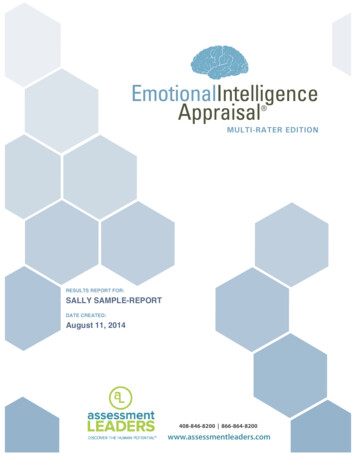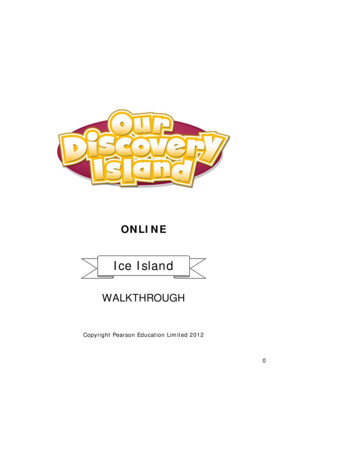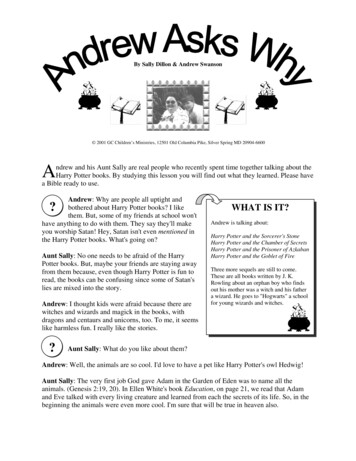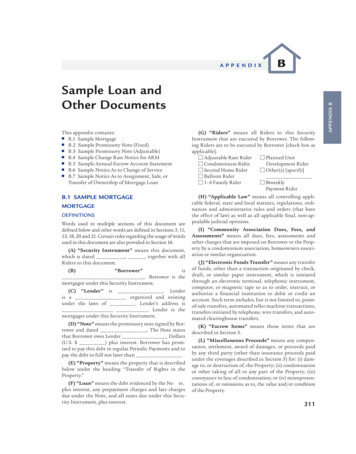
Transcription
RESULTS REPORT FOR:SALLY SAMPLE-REPORTDATE CREATED:August 11, 2014408-846-8200 866-864-8200www.assessmentleaders.com
ContentsMy EQ Results1About My Feedback1About My EQ Results2About My Raters3What the Scores Mean4Now for the Numbers5My Highest and Lowest EQ Behaviors6My Accuracy Scores7Rater Comments12My EQ Summary14How to Develop Your EQ16My EQ Resources17My EQ Lessons18Self-Awareness Lessons19Self-Management Lessons24Social Awareness Lessons28Relationship Management Lessons32i
EMOTIONAL INTELLIGENCE APPRAISAL About My FeedbackABOUT MY FEEDBACKThank you for completing the Emotional Intelligence Appraisal. You are now in a customized learning programthat contains feedback on your emotional intelligence skills. People familiar with your behavior answeredquestions about what they see you doing on a regular basis. Rather than evaluating you, they simply answeredquestions covering how often you do different things. You also answered these questions to provide a comparisonbetween your own perceptions and the perceptions of others.This learning program will teach you about emotional intelligence (EQ). You'll discover what your current skilllevels are and what you can do to improve. Each page has content for you to read, activities for you to enjoy, aswell as areas for you to set goals and track your thoughts. Listen to what others have to say about youremotionally intelligent behavior. What they say is about what they see now, and you can improve. This learningprogram will help you do so by providing a starting point for your EQ development.About Your Online ReportYou have unlimited access to your online report. You can access thisreport with the following log-in information:URL address: www.talentsmart.com/eqmrPassword:PZH7R2JKPlease consider the following as you move through your online learning program: Your online learning program is available 24 hours a day. You can use it to track your EQ goals andfurther explore what it means to be emotionally intelligent. You can download your report at any time so that you can print it and save it on your computer.Just click "Download" at the top of any page to do so.1
EMOTIONAL INTELLIGENCE APPRAISAL About My EQ ResultsABOUT MY EQ RESULTSThis section will provide: Information about your raters.Your overall EQ score and scores for each of the four EQ skills as rated by you and by others.Your three highest and lowest EQ behaviors.A detailed comparison of how you rated your behaviors in relation to how your raters responded.Comments made in response to two open-ended questions.An action plan to help you decide where to start your EQ Journey.What is Emotional Intelligence?Emotional intelligence is the ability to recognize, understand, and use your emotions effectively. This includespicking up on the emotional state of others and using this awareness to respond to them successfully.The four parts of the emotional intelligence model are based upon a connection between what you see and whatyou do with yourself and others.How Does it Work?Emotional intelligence often includes altering your natural response to a situation to get better results in both workand personal life. When people increase their awareness of emotions and their ability to manage them well, theyget a positive reaction from those around them. Unlike regular IQ, emotional intelligence can be greatly improved.What Can it Do for Me?Enhancing emotional intelligence is likely to increase your satisfaction with your work and personal life. Simplyput, emotionally intelligent responses get better results. Developing your emotional intelligence skills will help youreach your potential.Studies Show:People higher in emotional intelligence are happier with their lives and perform better on the job.2
EMOTIONAL INTELLIGENCE APPRAISAL About My RatersABOUT MY RATERSTo provide confidentiality for the people who provided you with feedback on your emotional intelligence skills, thetable below lists the number of people who were invited and how many responded to your Emotional IntelligenceAppraisal. This information will help you interpret the results of your feedback report. The average response rateto 360-degree assessments is 70%.Your Response RateNumber of people who responded5Number of people invited5Your response rate100%3
EMOTIONAL INTELLIGENCE APPRAISAL What The Scores MeanWHAT THE SCORES MEANScores on the Emotional Intelligence Appraisal come from a "normed sample." That means your scores are basedon a comparison to tens of thousands of responses to discover where you fall relative to the general population.Read the following descriptions to better understand what your scores mean about your current skill level.ScoreMeaningA STRENGTH TO CAPITALIZE ON90-100These scores are much higher than average and indicate a noteworthy strength.These strengths probably come naturally to you or exist because you have workedhard to develop them. Seize every opportunity to use these emotionally intelligentbehaviors to maximize your success. You are highly competent in this skill, so workto capitalize on it and achieve your potential.A STRENGTH TO BUILD ON80-89This score is above average. However, there are a few situations where you don'tdemonstrate emotionally intelligent behavior. There are many things you've donewell to receive this score and a few that could be better with some practice. Studythe behaviors for which you received this score and consider how you can polishyour skills.WITH A LITTLE IMPROVEMENT, THIS COULD BE A STRENGTH70-79You are aware of some of the behaviors for which you received this score, and youare doing well with them. Other emotionally intelligent behaviors in this group areholding you back. Lots of people start here and see a big improvement in theiremotional intelligence once it's brought to their attention. Use this opportunity todiscover the difference and improve in the areas where you don't do as well.SOMETHING YOU SHOULD WORK ON60-69This is an area where you sometimes demonstrate emotionally intelligent behaviorbut not usually. You may be starting to let people down. Perhaps this is a skill areathat doesn't always come naturally for you or that you don't make use of. With alittle improvement in this skill, your credibility will go way up.A CONCERN YOU MUST ADDRESS59 and BelowThis skill area is either a problem for you, you don't value it, or you didn't know itwas important. The bad news is your skills in this area are limiting youreffectiveness. The good news is this discovery and choosing to do somethingabout it will go a long way in improving your emotionally intelligent behavior.4
EMOTIONAL INTELLIGENCE APPRAISAL Now For The NumbersNOW FOR THE NUMBERS.You have an overall emotional intelligence score and a score for each of the four emotional intelligence skills.Your overall emotional intelligence score is a global measure of your emotional intelligence. Your scores for eachof the four emotional intelligence skills give you insight into your ability in the four core areas of emotionalintelligence. These scores are combined for your overall emotional intelligence score.Your Overall Emotional Intelligence ScoreAs you rated yourself: 77As rated by others: 76Personal Competence:The collective power of your self-awareness and self-management skills. It's how you use emotionalintelligence in situations that are more about you privately.76Self-Awareness76Your ability to accurately perceive your emotions and stay aware of them as they happen. This includeskeeping on top of how you tend to respond to specific situations and certain people.72Self-Management70Your ability to use awareness of your emotions to stay flexible and positively direct your behavior. Thismeans managing your emotional reactions to all situations and people.Social Competence:The combination of your social awareness and relationship management skills. It's more about how you arewith other people.84Social Awareness76Your ability to accurately pick up on emotions in other people and get what is really going on. This oftenmeans understanding what other people are thinking and feeling, even if you don't feel the same way.76Relationship Management80Your ability to use awareness of your emotions and the emotions of others to manage interactionssuccessfully. Letting emotional awareness guide clear communication and effective handling of conflict.- How I rated myself- How others rated meAll scores on the Emotional Intelligence Appraisal are measured on a 0 to 100 point scale. Scores tend to fallmuch like you would expect. Higher emotional intelligence scores are in the 80s and 90s. Lower emotional intelligence scores are in the 50s and 60s.5
EMOTIONAL INTELLIGENCE APPRAISAL My Highest And Lowest EQ BehaviorsMY HIGHEST AND LOWEST EQ BEHAVIORSThe following tables list your three highest- and three lowest-rated EQ behaviors based on how your ratersresponded to 28 questions. Each question in the Emotional Intelligence Appraisal was rated on a scale from 1 to6. The higher the number, the better the score—and the more often you demonstrate desirable EQ behaviors.The scale is listed below:1 - Never2 - Rarely3 - SometimesYour 34 - UsuallyHIGHEST5 - Almost Always6 - AlwaysEQ BehaviorsEQ BehaviorEQ Skill1. Communicates clearly and effectively.Relationship Management5.602. Is confident in his/her abilities.Self-Awareness5.403. Can be counted on.Self-Management5.20Self-Management5.20* Considers many options before making a decision.Score This score was created by calculating an average of the scores given to you by all of your raters.*This behavior was included because it had the same score as your third highest behavior.Your 3LOWESTEQ BehaviorsEQ BehaviorEQ SkillScore 1. Acknowledges his/her shortcomings.Self-Awareness2.202. Recognizes how his/her behavior impacts others.Self-Awareness3.203. Learns about others in order to get along better withthem.Relationship Management3.20 This score was created by calculating an average of the scores given to you by all of your raters.6
EMOTIONAL INTELLIGENCE APPRAISAL My Accuracy ScoresMY ACCURACY SCORESYour responses were compared to the average responses of others to determine your accuracy scores. YourAccuracy Scores are a reflection of whether you tend to Overestimate, Underestimate, or Accurately estimateyour skills. The pie chart below shows the percentage (%) of questions in your report that fall into each category.If your pie chart is predominantly one color, then this was your general tendency for these skills.Pie ChartYou can view which statements from your assessment fall into each of the three categories by clicking on thelegend of your pie chart below.Overestimation - 25%Underestimation - 7.1%Accurate estimation - 67.9%Overestimation is when you rated yourself higher than others rated you by at least a 0.50 gap.Underestimation is when you rated yourself lower than others rated you by at least a 0.50 gap.Accurate estimation is when the difference between how you rated yourself and how others rated you is lessthan a 0.50 gap in either a positive or negative direction.7
EMOTIONAL INTELLIGENCE APPRAISAL Accuracy Scores - Accurate EstimationMY ACCURACY SCORESYour Accurately Estimated StatementsThe table below lists the statements where you rated yourself essentially the same as others rated you. Thedifference was less than a 0.50 gap. Each statement was rated on a scale from 1 to 6:1 - Never2 - Rarely3 - Sometimes4 - Usually5 - Almost Always6 - AlwaysStatementSkillSelfOthers GapDirectly addresses people in difficult situations.Relationship Management5.004.600.40Uses sensitivity to another person's feelings tomanage interactions successfully.Relationship Management4.003.800.20Resists the desire to act or speak when it will nothelp the situation.Self-Management4.003.800.20Brushes people off when something is erstands how others influence his/heremotional state.Self-Awareness4.004.000.00Allows his/her emotions to take over when upset.†Self-Management2.002.20-0.20Is withdrawn in social situations.†Social Awareness2.002.20-0.20Learns about others in order to get along better withthem.Relationship Management3.003.20-0.20Recognizes how his/her behavior impacts others.Self-Awareness3.003.20-0.20Handles conflict effectively.Relationship Management4.004.20-0.20Shows he/she cares about what others are goingthrough.Relationship Management4.004.20-0.20Embraces change early on.Self-Management4.004.20-0.20Picks up on the mood in the room.Social Awareness4.004.20-0.20Can be counted on.Self-Management5.005.20-0.20Considers many options before making a decision.Self-Management5.005.20-0.20Explains him/herself to others.Relationship Management3.003.40-0.40Tolerates frustration without getting upset.Self-Management3.003.40-0.40 This score was created by calculating an average of the scores given to you by all of your raters.†This behavior is negatively worded; meaning, the less you do it, the more emotionally intelligent you are.8
EMOTIONAL INTELLIGENCE APPRAISAL Accuracy Scores - Accurate EstimationYour Accurately Estimated Statements Continued.StatementSkillSelfOthers GapStrives to make the most out of situations whethergood or bad.Self-Management4.004.40-0.40Is confident in his/her abilities.Self-Awareness5.005.40-0.40 This score was created by calculating an average of the scores given to you by all of your raters.9
EMOTIONAL INTELLIGENCE APPRAISAL Accuracy Scores - Under EstimationMY ACCURACY SCORESYour Underestimated StatementsThe table below lists the statements where you rated yourself lower than others rated you. The difference wasgreater than a 0.50 gap. Each statement was rated on a scale from 1 to 6:1 - Never2 - Rarely3 - Sometimes4 - Usually5 - Almost Always6 - AlwaysStatementSkillSelfOthers GapBlames others for difficult cates clearly and effectively.Relationship Management5.005.60-0.60 This score was created by calculating an average of the scores given to you by all of your raters.†This behavior is negatively worded; meaning, the less you do it, the more emotionally intelligent you are.10
EMOTIONAL INTELLIGENCE APPRAISAL Accuracy Scores - Over EstimationMY ACCURACY SCORESYour Overestimated StatementsThe table below lists the statements where you rated yourself higher than others rated you. The difference wasgreater than a 0.50 gap. Each statement was rated on a scale from 1 to 6:1 - Never2 - Rarely3 - Sometimes4 - Usually5 - Almost Always6 - AlwaysStatementSkillSelfOthers GapIs open to feedback.Social Awareness5.003.801.20Acknowledges his/her shortcomings.Self-Awareness3.002.200.80Hears what the other person is 'really' saying.Social Awareness5.004.200.80Is aware of his/her emotions as they happen.Self-Awareness4.003.400.60Handles stress well.Self-Management4.003.400.60Gets along well with others.Relationship Management5.004.400.60Notices other people's feelings.Social Awareness5.004.400.60 This score was created by calculating an average of the scores given to you by all of your raters11
EMOTIONAL INTELLIGENCE APPRAISAL Rater CommentsRATER COMMENTSYou and your raters also had the opportunity to elaborate on the feedback given to you through two open-endedquestions. The responses to the first question are listed below. Comments are listed as typed.Question 1:In what situations do you see Sally Sample-Report managing emotions effectivelyand forming good relationships with others?My Comments:I tend to get along with everyone at work and try to maintain trusting relationships with my coworkers. Imanage my emotions effectively with others when our goals are aligned and we are working closely with oneanother.Rater Comments:Comment 1Sally manages her emotions well when others are cooperating with her and she feels like shes getting theirsupport. She forms good relationships with people she can relate to or with people she feels will benefit her.Comment 2Sally keeps the big picture in mind, and attempts to build consensus toward group goals while remainingmindful of individual strengths and weaknesses. I think she genuinely cares about others' feelings.Comment 3Sally makes every effort to do the right thing for the team. When faced with a new project she makes sure toseek our input.Comment 4In client meetings Sally is in tune with the behavior patterns of others and adjusts her style to successfullyinteract with them.Comment 5Sally is a master at managing difficult client interactions. There are many times Ive seen her turn- aroundand recover situations with unhappy clients.12
EMOTIONAL INTELLIGENCE APPRAISAL Rater CommentsRATER COMMENTSYou and your raters also had the opportunity to elaborate on the feedback given to you through two open-endedquestions. The responses to the first question are listed below. Comments are listed as typed.Question 2:What do you wish Sally Sample-Report would do differently when it comes tomanaging emotions and relating well with others?My Comments:There are times when I may push people away because of my workload. I wish I could show the people Iwork with that they are just as important as the work I’m doing even when I am busy.Rater Comments:Comment 1I would like to see Sally increase her ability to show empathy as well as gain perspective on how her actionsand communication style affect people who work under her.Comment 2Sometimes Sally spends too much time checking in with everyone and doesnt respond quick enough tourgent deadlines.Comment 3When Sally is frustrated or under a lot of stress she struggles to manage her emotions around coworkers;this becomes apparent in her communication.Comment 4When Sally thinks something as unfair, she tends to react or respond too quickly. Sally should work onwaiting for a more appropriate opportunity to talk about her concerns.Comment 5Sallys self-assurance and skill at communicating sometimes intimidate others. This causes people who don'tfeel as confident to hold back their thoughts and opinions.13
EMOTIONAL INTELLIGENCE APPRAISAL My EQ SummarySALLY SAMPLE-REPORT’S EQ SUMMARYEmotional Intelligence is your personal and social competence skills (Self-Awareness, Self-Management, SocialAwareness, and Relationship Management).Response Rate5 of the 5 people you invited completed your Emotional Intelligence Appraisal, resulting in a response rate of100%.Overall EQ ResultsYour EQ ScoresEQ ent7270Social Awareness8476Relationship Management7680Overall14
EMOTIONAL INTELLIGENCE APPRAISAL My EQ Summary ContinuedSALLY SAMPLE-REPORT'S EQ SUMMARY CONTINUED.Lowest EQ BehaviorsYour 3LOWESTEQ BehaviorsEQ BehaviorEQ SkillScore 1. Acknowledges his/her shortcomings.Self-Awareness2.202. Recognizes how his/her behavior impacts others.Self-Awareness3.203. Learns about others in order to get along better withthem.Relationship Management3.20 This score was created by calculating an average of the scores given to you by all of your raters.Accuracy ScoresOverestimation - 25%Underestimation - 7.1%Accurate estimation - 67.9%Overestimation is when you rated yourself higher than others rated you by at least a 0.50 gap.Underestimation is when you rated yourself lower than others rated you by at least a 0.50 gap.Accurate estimation is when the difference between how you rated yourself and how others rated you is lessthan a 0.50 gap in either a positive or negative direction.15
EMOTIONAL INTELLIGENCE APPRAISAL How To Develop Your EQHOW TO DEVELOP YOUR EQFirst Decide What to Work OnTo decide where to start developing your EQ, find themes in: Your overall EQ scores Your lowest EQ behaviors Your under-estimated and over-estimated EQ behaviors Your raters' commentsThen Get Started Give yourself a few days to let the results in this EQ Summary report sink in. Commit to an EQ skill you will work on based on the themes you found in the data listed above. Talk with someone you trust about what you’ve learned and what you plan to work on. Practice one EQ skill at a time for one to three months, before moving on to the next skill. Foreach skill, focus on no more than three strategies at a time to develop that skill. Access the EQ resources on the next page to help you learn more and stay on track.16
EMOTIONAL INTELLIGENCE APPRAISAL My EQ ResourcesMY EQ RESOURCESTo develop emotional intelligence skills, you simply have to make the conscious effort to practice repeatedly untilthe new behaviors become habits. The following EQ resources are provided to help you do just that.EQ Resources OnlineInside Your ReportTalentSmart’s Goal Tracking System Here you will be able to set and share actionable EQ goals and choose the strategies you will practice toreach these goals. Simply select the EQ skill you will focus on first and then select a strategy from adrop-down list of the 66 proven EQ strategies included in Emotional Intelligence 2.0. You will also begiven the option to enter your own custom strategies. A summary of your plan will be stored. You mayset regular email reminders to help you work on your goals and share your progress with others.To access the Goal Tracking System , log on to your online report and click on the "Set and TrackGoals" box.My EQ LessonsIf you’d like new insights into the Self-Awareness, Self-Management, Social Awareness, andRelationship Management skills, watch and learn from 16 EQ lessons that include movie clipsdemonstrating EQ in action. These lessons have been designed to actively increase your understandingof, and capacity for, each EQ skill.To access the EQ Lessons, log on your online report and click on the "My EQ Lessons" box.Additional EQ ResourcesFor Help Along the WayRead Emotional Intelligence 2.0Emotional Intelligence 2.0 offers specific guidance with 66 proven EQ strategies that target the four coreEQ skills.To learn more about Emotional Intelligence 2.0, go to www.talentsmart.com/book.Access an EQ MentorTo keep you motivated to practice, read the following article to find and use an EQ Mentor."How to Choose and Use an EQ Mentor" can be found at www.talentsmart.com/articles.Seek an EQ CoachAn EQ coach provides expert guidance in creating your emotional intelligence action plan and keepingyou focused and accountable for lasting change.To learn more about TalentSmart's expert EQ coaches, go to www.talentsmart.com/coach or call1-888-818-SMART.17
EMOTIONAL INTELLIGENCE APPRAISAL My EQ LessonsMY EQ LESSONSThis section contains sixteen EQ Lessons that will help you actively increase your understanding of, and capacityfor, each EQ skill. Emotional intelligence is very different from traditional intelligence (IQ). With IQ, it is understoodthat you are generally as smart now as you are ever going to be. People learn new facts but their intelligence, ortheir ability to learn, remains largely the same. Emotional intelligence is a flexible skill that can be readily learned.People increase their emotional intelligence by working on the skills outlined in this learning system.Research shows that people improve their EQ most when the following conditions are present: They have a strong motivation to learn or changeThey practice new behaviors consistentlyThey seek feedback on their own behaviorHow to Master A New SkillAny time you are acquiring a new skill, remember the best path fordoing something new or different looks like this: Find someone who is good at it.Watch that person do it.Get that person to talk about how they do it.Practice doing it yourself with his or her guidance.Ask the person to give you feedback.Practice doing it on your own.Seek feedback until you've mastered it.Change can be a little.Embarrassing, because as you practice new things, the very people who feel you ought to change may poke funat you, forget to encourage you along the way, or not even notice. Don't give up. The rewards will outweigh thesechallenges because you will be better positioned personally and professionally than you ever were before.How to handle it when you feel embarrassed: Say, "I could really use a little support here."Tell people you are serious about getting better at this. Most likely, they will become your allies.Ask for help and suggestions.Change can also be a little.Frustrating, because old habits and behaviors (what you say and do) can be difficult to change.How to handle it when you feel frustrated: Remind yourself that change takes time and practice.Remind yourself that it's OK not to know.Find someone who handles change well. Ask how it's done.Find someone who can encourage you.Change can also be terrific. It surprises most people how a little bit of change in the right direction can goa long way in the eyes of others. Good luck and have fun with it!18
EMOTIONAL INTELLIGENCE APPRAISAL Self-Awareness LessonsSELF-AWARENESS LESSON 1: FEEDBACKTo increase your self-awareness, you need to discover things you tend to do, say, think, and feel that you havepreviously failed to notice or understand. This process can be uncomfortable because some of the things you'lldiscover are unflattering or things you'll want to improve. That said, it's much less painful to seek out thisinformation on your own than wait until someone brings it to your attention.In the following clip from Role Models, Dan (played by Paul Rudd) increases his self-awareness the hard way.Log in to your assessment to watch the clipHow does Dan increase his self-awareness the hard way?She's had enough.Dan gets defensive.Dan realizes he's wrong.She's had enough.Being in a relationship with Dan means Beth is frequently subjected to his bad moods. She finally realizes thathe's so annoyed with everyone because he's unhappy with himself. Beth knows Dan won't change until heunderstands this. So, she breaks it down for him.Dan gets defensive.Like most people in his position, Dan is quick to point out justifications for his behavior. Dan genuinely believeshe's so annoyed because people are so annoying. Beth's feedback doesn't even begin to hit home until herealizes that venti means "twenty."Dan realizes he's wrong.By the time Dan gets to work and discusses the morning's events with a friend, it's clear that Beth's feedback hashad a chance to sink in. Not only does Dan think Beth is right, but Dan's coworker also agrees with her. The moreDan thinks about Beth's feedback, the more he begins to see what is making him so frustrated.SELF-AWARENESS TIPTo increase your self-awareness, you need to embrace feedback with open arms. Research shows that the vastmajority of people struggle to see themselves as others see them, and the most accurate picture of anyone'sbehavior comes from those around them. The best way to find out what others see is to ask them. Asking forfeedback is easy—hearing it without getting defensive is not.Seeking feedback is difficult for most people. It can be scary when you are afraid to finally find out what peoplereally think of you. Nonetheless, feedback from others won't do you any good if you're not open and receptive toother people's perspectives, especially when they differ from your own.Here's a process you can follow to seek feedback that will increase your self-awareness: Seek out a trusted friend or colleague and ask this person if he or she would be willing to share hisor her thoughts about you with you. A "real" feedback discussion is bound to have some difficultmoments, so you need to find someone with whom you can work through these momentscomfortably. Explain to your selected person that you are working on increasing your self-awareness as a resultof reading the Emotional Intelligence Appraisal. Tell him or her what emotional intelligence is anddescribe some of your goals for improving your emotional intelligence (EQ).19
EMOTIONAL INTELLIGENCE APPRAISAL Self-Awareness LessonsSELF-AWARENESS LESSON 1: CONTINUED Ask this person to share with you what he or she sees and thinks regarding your ability tounderstand and respond effectively to your emotions. Be sure to get information on things thataren't readily apparent to you. The following questions should help this conversation: Are there specific situations where, or people with whom, I tend to let my emotions get the best ofme? Is there anything I do too much? That is, can I tone down a certain behavior? What holds me back from managing my emotions effectively?20
EMOTIONAL INTELLIGENCE APPRAISAL Self-Awareness LessonsSELF-AWARENESS LESSON 2: EMOTIONAL MISTAKESIncreasing your self-awareness is not going to be a perfect process. There will be times when your emotions slipbeneath your awareness and get the better of you. These emotional "mistakes" are opportunities to gain a betterunderstanding of your tendencies so that you can change for the better.In Envy, Tim (Ben Stiller's character) and Nick (Jack Black's character) are best friends, neighbors, andco-workers at 3M. Nick recently struck it rich when he invented Vapoorize, a spray that makes dog poopevaporate. Tim's envy grows with Nick's wealth until it eats him up inside. Watch Tim come clean with Nick.Log in to your assessment to watch the clipHow does Tim demonstrate self-awareness?I Should Have Just Told You.It Was Chewing Me Up.You Just Gave To Us, Nick.I Should Have Just Told You.Tim comes to the realization that his feeling of envy toward Nick is not good for their friendship. Fortunately, Timbecomes aware of this and decides to tell his friend. By telling his friend the truth, Nick is using his emotionalmistake as an opportunity to improve both himself and their friendship.It Was Chewing Me Up.Negative emotions that go unchecked are bound to affect your well being negatively. Tim feels guilty once herealizes that he is "wrapped up in the envy for everything" that Nick has. The surprising thing aboutself-awareness is that just spotting your mistakes will help you change, as you can't expect to improve until youunde
EMOTIONAL INTELLIGENCE APPRAISAL About My EQ Results ABOUT MY EQ RESULTS This section will provide: Information about your raters. Your overall EQ score and scores for each of the four EQ skills as rated by you and by others. Your three highest and lowest EQ behaviors. A detailed comparison of how you rated your behaviors in relation to how your raters responded.











